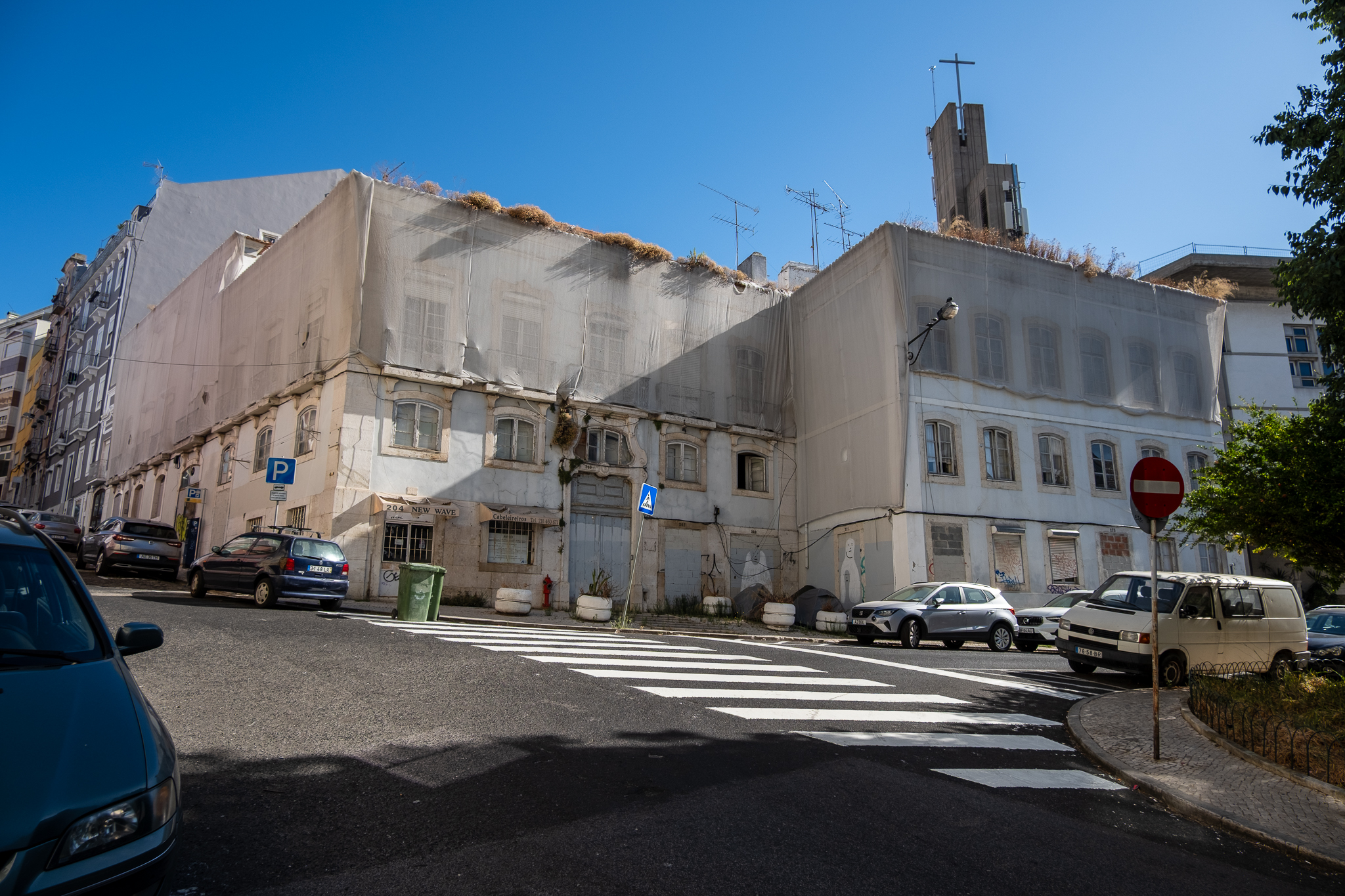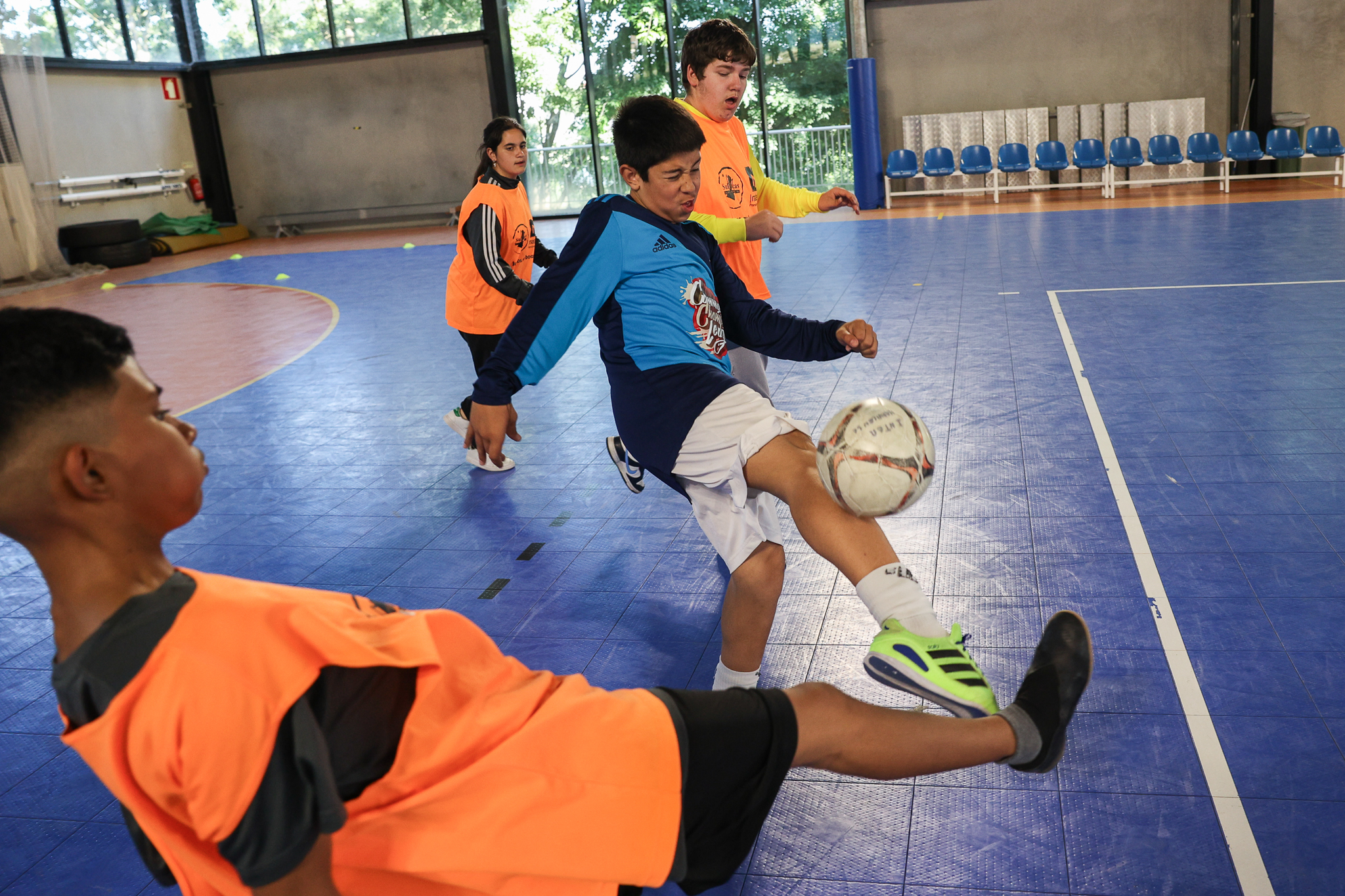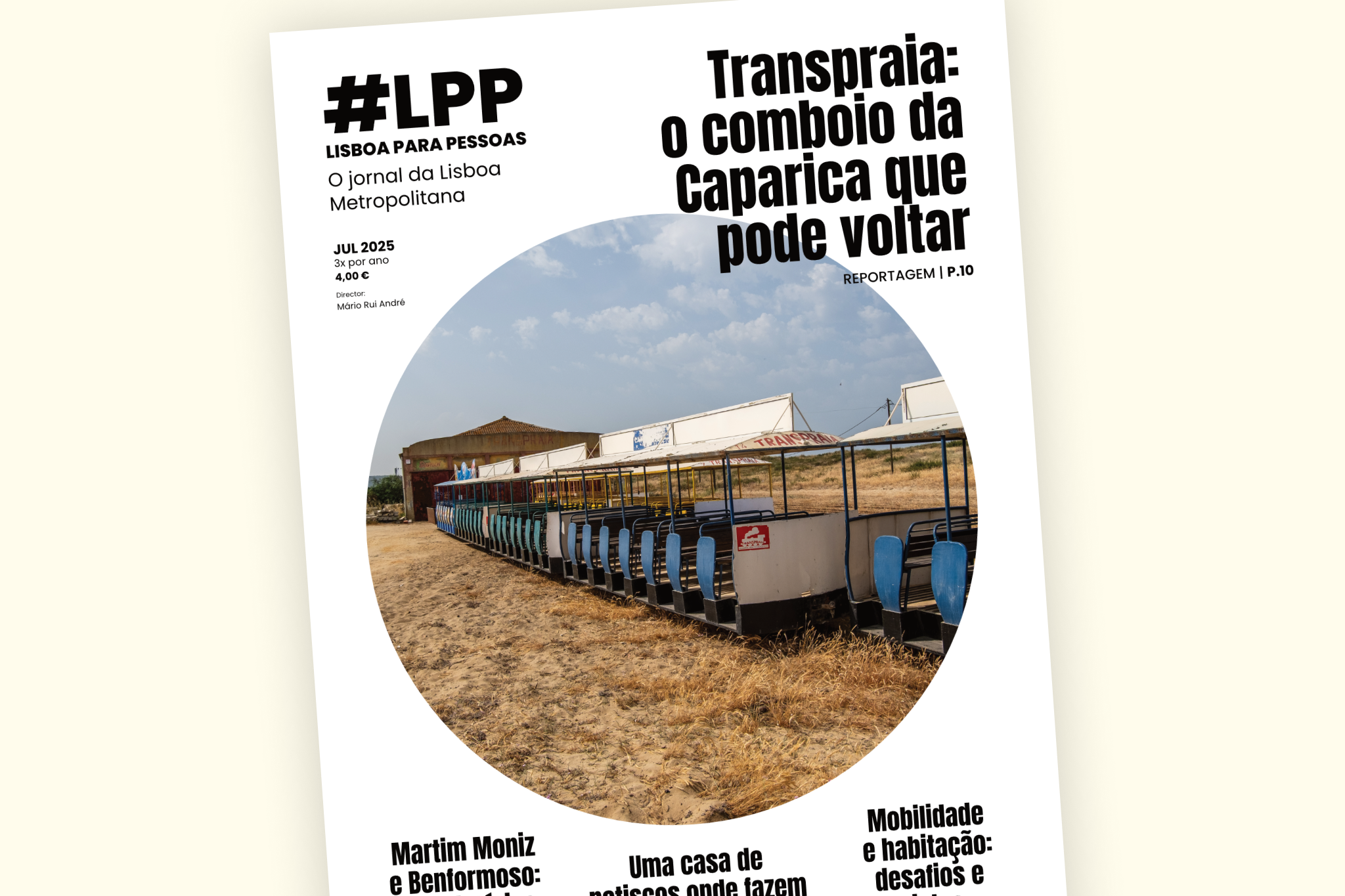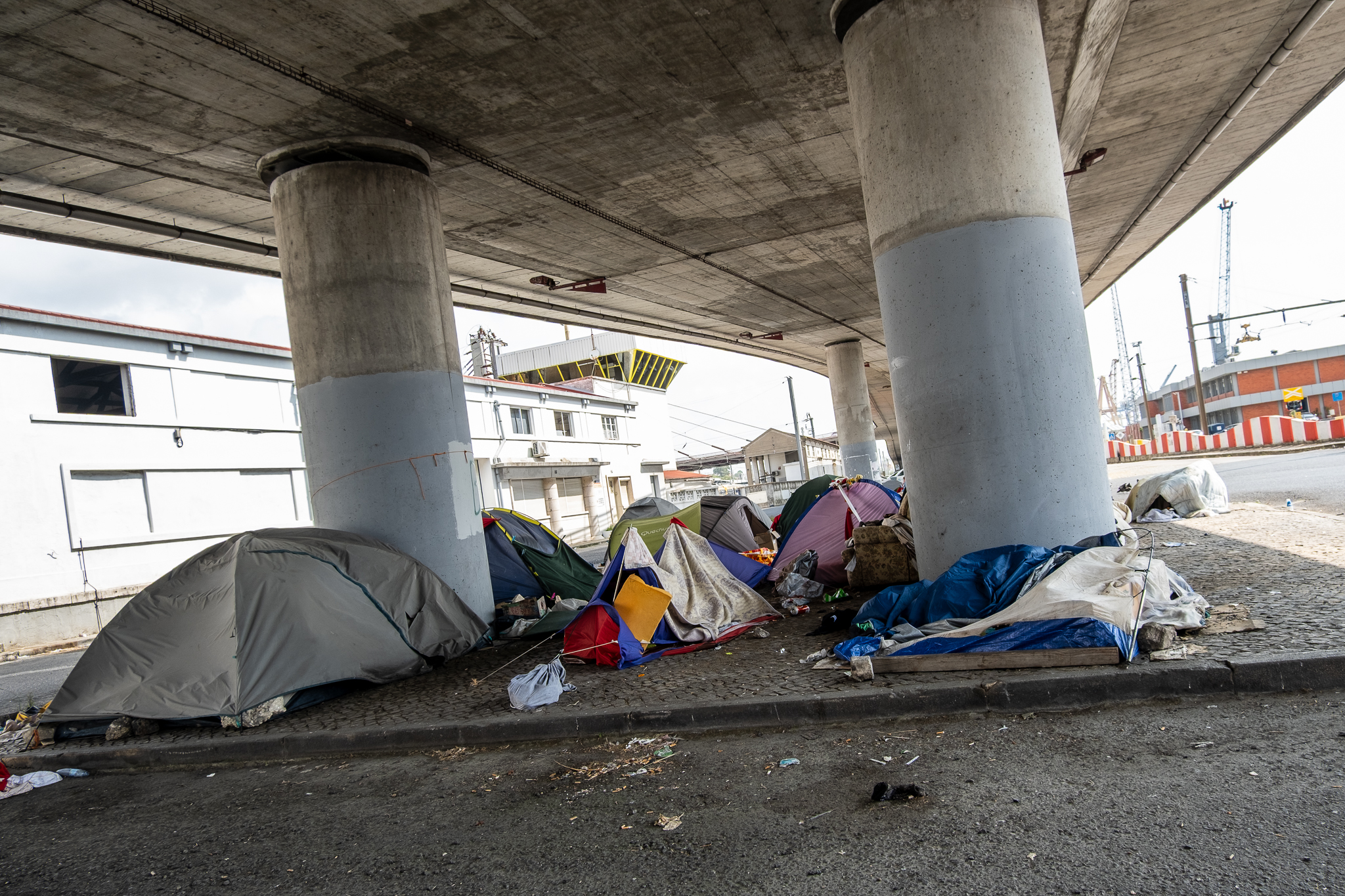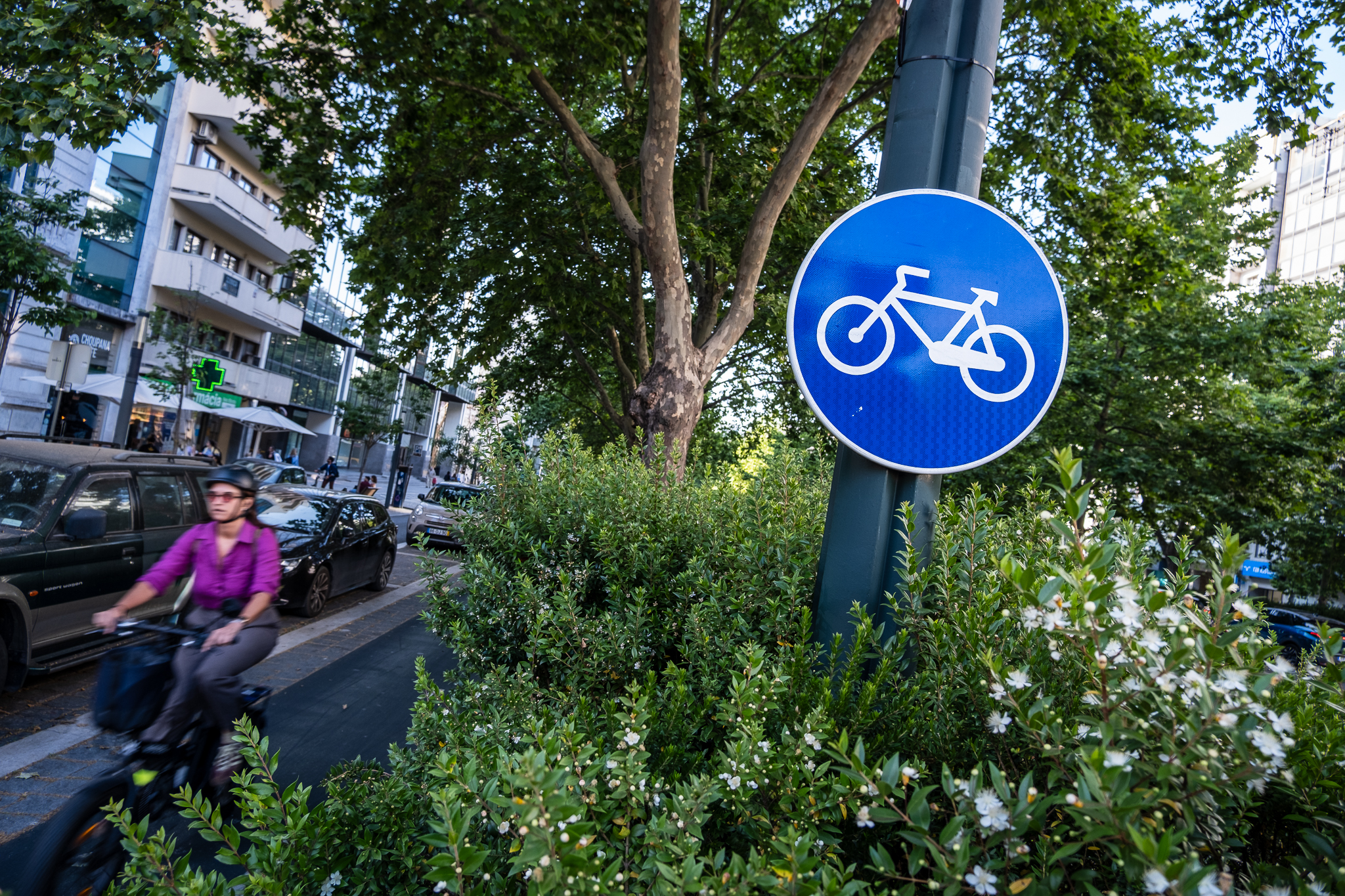Last Saturday, the Lisboa Possível collective and the Volt party closed two streets in the parish of Misericórdia to cars and opened them to people, in an event that was supported by local restaurants. "Traders told us that this idea that they need cars to pass by to make more money is wrong. During Covid,...

Ksenia Ashrafullina, activist of the collective Lisbon PossibleI wanted to show that a "superblock" (or "super-neighborhood", as you prefer to call it) is a "superblock". possible in Lisbon. And I also wanted to show that it is possible close streets to cars and open them to commerce and people. But it was not possible to make these proposals a reality on her own. That's why she joined Volt, a political party that, despite having no representation in Lisbon's local bodies, wanted to take to the streets to campaign and show that it is possible another Lisbon.
Last Saturday, July 8, Rua and Travessa dos Mastros, in the parish of Misericórdia, in Lisbon, have been without cars and with many people inside. The event, organized between Lisboa Possível and the Volt Portugal, sought to give the street back to people and also to commerce. Restaurants and bars were able to set up tables outside, boosting their business; and many people were able to take advantage not only of these terraces, but also of the activities that were organized throughout the day on those two streets. There was a talk on "how to change the system" and improve our relationship with the planet, an "activist fado" workshop, poetry declarations, a performance by a Ukrainian folklore group, an Asian book market, and other activities. All activities ended before 22:30 so that residents could rest, and there was a concern not to leave litter on the street or use disposable objects.

"We are a new party on the Portuguese political scene and we want to do politics in a different way, and it can be this way, celebrating public space and showing that the street can have other uses, and not just serve for cars to pass", explains Duarte Costa, head of Volt. "Under Portuguese law, parties have complete freedom to do political work in the streets, and that's good, it's an April achievement that serves all parties. And we used this legal device to be able to give people this opportunity to be on the street, to talk, to have this street for them." This is not the first time Volt and Lisboa Possível have worked together, but for Ksenia the collective's party independence remains guaranteed: "We work with anyone who wants to work with us."





Travessa dos Mastros, together with Rua dos Mastros and Rua da Silva, starts from Rua dos Poços dos Negros; Travessa dos Mastros makes an "L" shape and intersects with Rua dos Mastros and Rua da Silva, which are parallel and both end at Largo do Conde Barão, in Santos, in the parish of Misericórdia. "We have two equal streets here, but one is dead and the other alive"jokes Ksenia. "I live here in the parish of Misericórdia and I regularly cross this block. What do I do? I always go through Rua da Silva because I feel good there, I feel safer, without fear of being run over or having to lean against the building for the car to pass. I never go down Rua dos Mastros."
The three streets have a similar profile: they are narrow streets, with small sidewalks and surrounded by low-rise buildings. During the Covid-19 pandemic, they were without cars, allowing restaurants to take advantage of the outdoor space at a time when social distancing was necessary and there were impositions on the level of capacity in closed spaces. After this exceptional situation, Rua da Silva was the only one to remain without car traffic; in fact, this street, which has since become known as "Green Street Lisbon" and as a street full of plants, has become a small tourist attraction in the city and has many people walking or using the restaurant terraces. Besides Rua da Silva, Rua do Merca-Tudo and Travessa dos Pescadores are also pedestrianized.

In the event organized on Saturday, entitled "Com Gente Dentro", the collective Lisboa Possível and the Volt party wanted to give Rua dos Mastros and also Travessa the social and commercial dynamics that exist in Rua da Silva, also showing that 40 cm of sidewalk is not a sidewalk, that "play places" (a pun with "parking spaces") are missing and that it is possible have streets where people can open their windows without worrying about the exhaust pipes coming out. Lisboa Possível and Volt support the pedestrianization of these neighborhood streets and have the support of the various restaurants and bars established there - Copa Lisboa, Mamma Gaia, Miss Dumpling, Sekai Sushi Bar, Sekai Cocktails, In Noodles, O Fatica and Modjo -, which were involved in promoting this initiative. "Before we did this event, we spoke to traders who told us that this idea that they need cars passing by to make more money is wrong. They saw that during Covid, when the streets were closed, they made more. They told us that they lost 40% of turnover"Ksenia explains.

Not all the establishments that operate today on Rua e Travessa dos Mastros existed in the Covid era, when they were mostly pedestrianized. Miss Dumpling, for example, started during the pandemic with home deliveries but only recently gained a physical address in Santos. Hélder Beja, owner of this Chinese food restaurant, was pleased to finally be able to put the menu board in the middle of Travessa dos Mastros. And for having a terrace. "When we opened two and a half months ago, we spoke to the Parish Council to understand the feasibility of a terrace. We were told that the terrace that the restaurant before ours had was an exception due to the pandemic and that it was impossible to have one because there were two licensed garages on the street. We accepted the rules, of course"he says. However, Hélder says has never seen these garages being used and says that Travessa "It becomes a kind of open-air parking lot, especially during the week. People who work here or come for lunch elsewhere park here on the street and even leave their phone numbers on their cars. Suddenly there are five or six cars lined up here. And it's a pity that the authorities don't allow terraces but also don't do anything about it, which ends up taking away everyone's quality of life.". In other words, the Travessa is neither for traffic nor for walking, but for informal and free parking.

The head of Miss Dumpling would love it if not only the Travessa but also Rua dos Mastros could be closed to cars "always or with a pylon and card access to those garages which, as I said, are not used but which exist and the owners have the right to use them". "And if they couldn't be closed all the time, let them be closed at least at the weekend. They are two old streets, very narrow. It's not possible for a wheelchair or a baby carriage to pass in the conditions the streets are in today, one with cars passing and the other with parked cars." , laments Hélder.
Saturday was a special day for the Mastos restaurants. "It's very nice to see these streets with tables and people sitting. We put a little low music outside. It's nothing like the other days. Even for those who are working here, the atmosphere changes immediately." Hélder hopes that this day will show that "With a little bit of political will it is possible to make this area much more attractive, without, once again I say, without affecting the life of the residents, on the contrary, also improving the life of the residents because nobody wants - at least, I don't want - to turn this into a party neighborhood. We just want to be able to use the street as it should be used, for people, with people in it, as we say"The young entrepreneur is aware of the problems that pedestrian streets with many restaurants, bars and terraces can sometimes pose for residents. "We don't make noise e By 11 o'clock at night we're already closing everything down."

For his part, Felipe Resende is the owner of O Fatica, a Brazilian food restaurant located on Rua dos Mastros. He is also a resident of the same street and prefers to speak as such. “It's a street that's too narrow to have car and bus traffic because it's an affront to people's right to walk. People can't just use the sidewalk to walk", refers. "This impacts the quality of life of the people who live here, who work here, who want to live on the street and can't. It's very sad that this street has gone back to cars. It's very sad that this street has gone back to cars." Felipe already lived here during the pandemic, when the street was cut off. “Having a terrace is important for business, but it is not the main thing, it is not my agenda. I speak more as a resident than as a trader. I wanted to have a street so I could walk quietly, without worrying about cars. This is very sad, you know? It's a historic center, it's a street that could be beautiful, where several activities, several things could fit." Sonia is Felipe's neighbor; it was in the Rue des Mastres that she found an apartment when she came from France a few years ago, and that Saturday she was offering massages on the street - she set up a small stall in no time."I wish I had known about this event earlier so that I and other residents could prepare something to offer here on the street. These opportunities are good to share between neighbors, because during the day we are working and don't see each other." Sonia was pleased to see that block without cars again. "We had these experiences during Covid and on some weekends, and it was quite good. People, and especially children, could walk much more easily, safely. It was like a small village."

The Mamma Gaia pizzeria also opened recently - in January - and is the second restaurant of Gonçalo Rodrigues, who has another establishment on the pedestrian Rua da Silva. "I feel a lot of difference. The difference is huge, it's abysmal. I can say that the restaurant there [Rua da Silva] does three times what I do here, per day. I believe it's because there are terraces there and not here.", he points out, noting that the number of people who can sit inside both restaurants is identical. "For example, is a person now in the summer, with 30 degrees, going to want to drink a cocktail in a place with a terrace or in a closed space?" The young owner would like to see Rua e Travessa dos Mastros back to being road traffic free. "This is a historic neighborhood, the sidewalks are minimal and there are cars that go by fast. If you're more distracted coming out of a restaurant or home, you're bound to get hit by a car. Because when a person comes out of a store, they're distracted." Gonçalo also asked the Junta de Freguesia for a terrace, which was denied. "We didn't even have a way to fight for a terrace because we were immediately denied because a bus was passing by [on Rua dos Mastros]. But, as we see today, there is no bus. It goes around another street and everything is fine."
The bus Gonçalo is talking about is the 22B, the Neighborhood Career of the parish of Misericórdia which crosses Rua dos Mastros on its circular route between Príncipe Real and Cais do Sodré. Ksenia says the 22B, which doesn't stop on that street, could go through the wider Rua das Gaivotas (100 meters away) - as it did that Saturday - or Avenida Dom Carlos I (80 meters away). Over the past few months, Lisboa Possível has been listening to the opinion of the residents of Mastros, also to collect tips, fears and objections not only about the event they were going to do on Saturday, but also about what those two streets could be from then on. "We are doing street work to really change something here, on the street where people will continue to live after this Saturday." The topic of the bus was central to the conversations. "To say that this street has to stay like this for the bus and for all the traffic just because someone has to go to the health center or to Mercado do Ribeira doesn't make sense"The activist comments, based on testimonies from residents. "There are parallel streets at 100 meters or less. This street should be part of this 'super-neighborhood' concept that we are trying to develop to create a safe ecosystem and the urban fabric itself invites that."

Ksenia and Lisboa Possível have been trying for several months to convince a city parish council to organize, for one day, a "superquarteirão" (or "superbairro") - that is, an area where car circulation is reorganized in order to divert crossing traffic to the surrounding main streets, allowing walking and cycling to be given priority within the block (without eliminating, of course, access to garages and emergency vehicles). A "superblock" was planned around Praça das Flores with the support of the Misericórdia Parish Council, but due to difficulties in gathering authorizations, responses and consensus from the various parties to close the surrounding streets, the initiative ended up not taking place. Ksenia then changed strategy.
The relationship between Lisboa Possível and Volt is not new and arises once again from the alignment between the ideas defended by the collective and the political party. "We need to materialize the dream of the city we want to have. A city with more space for people, a city with fewer cars, a city with better air quality and a city aligned with the climate challenges we face. And here we have a problem in Misericórdia. We have a Parish Council that is very resistant to the idea of pedestrianizing this area and says that pedestrianizing is penalizing. We profoundly disagree with this, and so does Lisboa Possível.", points out Duarte Costa of Volt. "We want more space for people, as we already have in many European cities, including in some cases through local Volt elected officials, who have introduced these changes. We want to do the same in Lisbon. And here today is a day to enjoy, a day to dream that this Lisbon is possible."
"What I feel throughout this day when I have been talking to people who pass by, with the merchants, and with the customers of these merchants, is that it makes no sense for these streets to have traffic. They were not designed from scratch to have cars and even do not comply with the law regarding the minimum width of sidewalks and street for cars ", said the Volt leader. The event set up on Saturday brought several people to Rua e Travessa dos Mastros, who enjoyed the restoration but also the proposed program. There were children and adults drawing on the asphalt or playing in the street, for example, playing the monkey game. Volt has been campaigning, also in an attempt to make itself known to the people in the hope of getting elected locally in Lisbon for the first time in the next elections. "We need people to get to know us, to know what we're here for and to be able to trust us when it comes to electing them, to allow us to represent them and even give them space to be represented within the Volt.", says Duarte, for whom this event "it's a very accessible way for people to feel that, because it's a concrete street action that improves their quality of life".

"In the European context, the Volt already has 130 elected representatives at all levels, from local to European, in several countries in Europe. We have Volt elected officials, for example, in Germany and also in the Netherlands who have already achieved this type of measures to close streets to car traffic and open them to other uses, to rethink the urbanism of cities and to reduce parking in areas that harm public space, transferring it to other areas and betting on other forms of mobility. And as we are all one European party, I think there is a great advantage here that we can bring this European perspective to Portugal, to Lisbon, to local politics, in a way that perhaps no other party can do as well. And this initiative aims precisely to show that this is possible", says Duarte.
For her part, Ksenia would like to see more parties closing other streets in other parishes and towns. "We would like other parties, associations, collectives... to take this idea and do more, to copy, to improve. And if the council is not there yet because it is late, we cannot be late because of the council. We have to do what is the future, which is to bring people out into the street, make them understand this thing about car-free streets so they can ask for it. And then this changes the electoral cycle, because suddenly the residents want it and they have to promise it to win the election."

